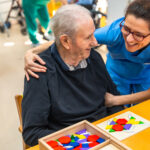Obsessive compulsive disorder (OCD) is an anxiety disorder that usually begins in early adolescence.
OCD can cause persistent thoughts, images and impulses that are intrusive and unwanted – this is also known as obsessions.
OCD can also cause a person to perform repetitive and ritualistic actions that are often time-consuming, excessive and even distressing – this is otherwise known as compulsions.
People with OCD are aware of the excessive and irrational nature of their compulsions and obsessions, and often feel unable to control or resist them.
Symptoms: Obsessions
Obsessions tend to be exaggerated versions of worries and concerns that most people have. Some common obsessions include:
- Fear of:
- Contamination from germs, dirt and other physical and environmental substances
- Harm from illness, accidents or death, causing an excessive sense of responsibility for preventing this harm
2. Intrusive thoughts and images about:
- Sex
- Violence
- Accidents
3. Excessive concern with orderliness, symmetry and neatness Excessive concerns about illness, morality, religious issues
4. An excessive need to know and remember things
Obsessions can constantly be in a person’s mind and are triggered by situations, smells, physical objects, television, radio or a conversation.
Obsessions can vary in severity and doesn’t always respond to logic and reason. They can also produce feelings of irritation, discomfort, disgust, acute distress and panic.
Symptoms: Compulsions
Compulsions can be actions or thoughts. These are repetitive and often carried out in a specific pattern and/or rules.
Compulsions are used to:
- Prevent an obsessive fear from happening
- Reduce the anxiety the obsessive thought creates
- Make things feel ‘just right’ for the person
Some compulsions include:
- Excessive hand washing, tooth brushing and showering
- Excessive cleaning of the house, household items, food and other areas
- Excessive checking of locks, electrical and gas appliances, and other things associated with safety
- Repeating routine activities and actions such as reading, writing, walking, picking up something or opening a door
- Applying rigid rules and patterns to the placement of objects, furniture, books, clothes and other items
- Touching, tapping or moving in a particular way or a certain number of times
- Needing to constantly ask questions or confess to seeking reassurance
- Mentally repeating words or numbers a certain number of times, or concentrating on ‘good’ or ‘safe’ numbers
- Replacing a ‘bad thought’ with a ‘good thought’.
Compulsions can become ritualistic; they follow specific rules, patterns and constant repetitions.
Compulsions and obsessions can consume a lot of time from a person’s day and can interfere with social relationships, education and employment.
As OCD becomes more severe, the person may avoid anything that can trigger obsessive fears.
OCD can also make it difficult for people to perform everyday activities. Some people may also become housebound. OCD is often accompanied by depression and other anxiety disorders, such as social anxiety, panic disorder and separation anxiety.
People with OCD are often acutely embarrassed about their symptoms and will put great effort into hiding them.
Before the disorder is identified and treated, friends and families may become deeply involved in the individual’s rituals, which can cause distress and disruption to all those involved.
OCD Diagnosis
At Dementech Neurosciences Clinic we are offering end-to-end services for all the different levels of care that a patient requires.
The diagnostic process will usually involve two consultations, one with a mental health care specialist (psychologist or psychiatrist), who will ask you about your symptoms, your thoughts, feelings and behaviour patterns, followed by a series of individualised neuropsychological assessments performed by a neuropsychologist.
A physical examination, laboratory tests and imaging scans are sometimes necessary in order to rule out other physical problems that could cause your symptoms.
In cases where a diagnosis of a disease has been established, our multidisciplinary team will do everything humanly possible to treat symptoms and prevent them from progressing further, involving as many specialists as required, hence improving the quality of life, the emotional health and the well-being of each individual.
Treatment for OCD
Treatment for OCD can include:
- Psychological treatments such as cognitive behaviour therapy
- Anxiety management techniques
- Support groups and education
- Medications
Tips for living with OCD
There are many ways that you can help yourself in addition to seeking therapy. Some suggestions include:
- Whenever you get the urge to perform a compulsion, refocus your attention and time on something else, such as doing some exercise.
- Write down obsessive thoughts or worries. From this, you will be able to identify and track how repetitive your obsessions are.
- Try to anticipate compulsive urges to help ease them. For example, if you compulsively check that the oven is off, try and turn it off with extra attention the first time. Then, when the urge arises later it will be easier to label the urge as an ‘obsessive thought’/
- Set aside time daily for worrying – worry period. Rather than suppressing obsessions or compulsions, set aside a time for obsessing. This will help you to leave the rest of the day free of obsessions and compulsions. When the urges and thoughts arise, write them down and postpone them to your worry period.
- Most importantly, take care of yourself. Although stress doesn’t cause OCD, it can trigger the onset of obsessive and compulsive behaviour and can often make it worse. Practice relaxation techniques for at least 30 minutes a day.
If you suffer from obsessive compulsive disorder and self-help strategies listed in this blog still isn’t helping, you may benefit from receiving specialist treatment.
Contact us today to speak to one of our patient advisors who will advise you on the best route.





